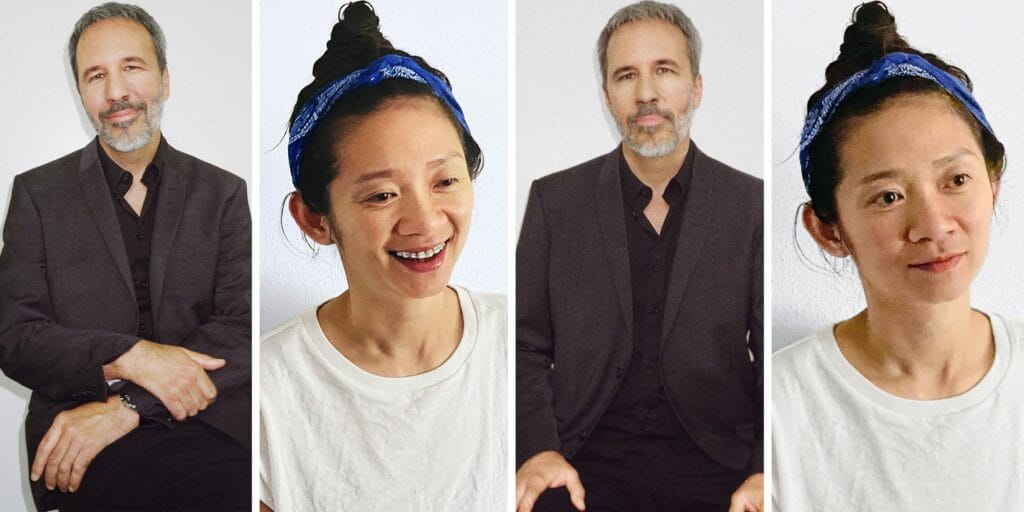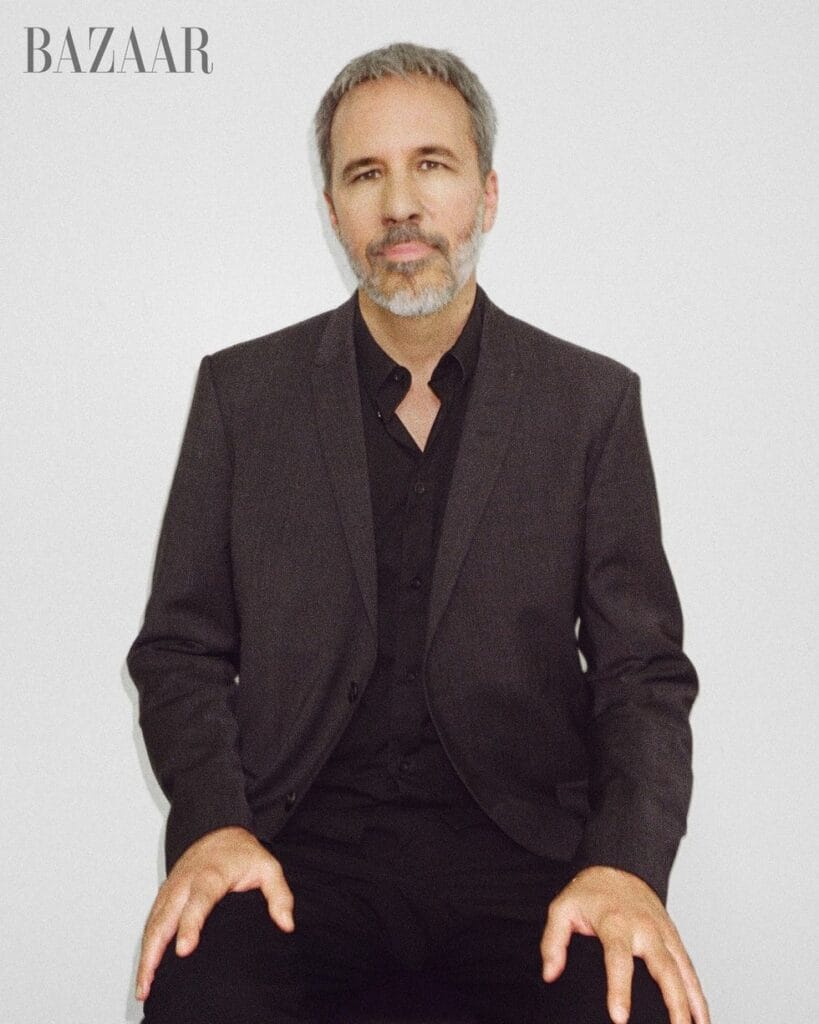
JOSHUA JAMES RICHARDS AND CHRISTOPHER SHERMAN
What does it look like to go to the movies now? The days of must-see-it-in-the-theatre, with popcorn and a soda as big as your head, are not entirely gone, but they’re more of a question mark. The pandemic has upended the model for movie releases, and streaming new movies directly into living rooms seems like a development that is unlikely to disappear.
Perhaps no two directors are better suited to tackle the question of “What next?” than Chloé Zhao and Denis Villeneuve. Zhao, who made history at this year’s Oscars when she won the Best Director award for Nomadland, has taken on the latest Marvel instalment, Eternals, which came out in early November. Villeneuve’s reimagining of Dune, starring Timothée Chalamet and Zendaya, is one of the most hyped projects to emerge from the pandemic.
For this conversation, Zhao dialled in from her Prius in a parking lot outside her dentist’s office in Santa Barbara, California; Villeneuve from his home in Montreal. Their deep admiration for each other’s work was immediately apparent as the pair engaged in a wide-ranging conversation that covered the creative process, Star Wars, and why it is so vital that we keep going to the movies (when it’s safe to do so).

PHOTO BY JOSHUA JAMES RICHARDS
DENIS VILLENEUVE: I’m your biggest fan. I think it’s genius that Marvel approached you because you’re the radical opposite of it aesthetically. When I saw The Rider for the first time, I was blown away. I wrote a note to you—an artistic love letter. What touched me was your insane skill to be able to approach life. Life is so afraid of the camera. When I saw The Rider, I cried because I was like, “She did it. She was able to go in that zone that I thought was not possible.” I wonder how you can invite life in a Marvel movie.
CHLOÉ ZHAO: Isn’t there a feeling that keeps you going? This wonderful and complicated life we live as human beings, the desire to capture it and navigate it and present it in a way so it can speak the truth through poetry?
DV: In a clumsy way, I try to re-create life by bringing chaos in front of the camera. But with you, I feel that you are in total control of what’s happening in front of the camera.
CZ: I think I’m doing the opposite. On set, it is very chaotic, and then we’re trying to find it in the edit, trying to figure out how we can contain this. I watch your movies and I think, How?! The craft that’s behind your movies, it comes with a strong, singular vision.
DV: I think what you’re bringing to cinema is vital, and it’s like oxygen that was needed in the room.
Isn’t there a feeling that keeps you going? This wonderful and complicated life we live as human beings, the desire to capture it and navigate it and present it in a way so it can speak the truth through poetry?
—Chloé Zhao—
CZ: Oh, my gosh. Okay, well, I would like to apply for a job on your set to be your assistant. You know, when I went to pitch Eternals, I had stills from your films as references. I’m naturally drawn to filmmakers who have a very strong hand in world-building. When I watch your films, even though they’re of different genres, from Sicario to Arrival to Prisoners and then Blade Runner 2049, you managed to build such visceral worlds I can feel and almost touch. Can you talk about having IMAX in mind when you shot Dune?
DV: I will start with a cliché, which is that cinema is the closest thing to the dream experience. It can be so, so immersive. I think IMAX is 10,000 times more immersive than 3D. For me, 3D is a filter between me and the movie. It’s a bit of a gadget, frankly. But with IMAX, the frame doesn’t exist anymore. You’re just falling into the image. Blade Runner 2049 was the first movie I did in IMAX format. And something I was not expecting was that it increased the intimacy with the character. Before, I thought IMAX was more about scope, but, no, it’s about immersion and intimacy. When I decided to do Dune, my first decision with cinematographer Greig Fraser was to go full IMAX.
CZ: The future of cinema, the future of the theatrical experience—it’s very interesting to put that money on IMAX.
DV: At the end of the day, for me, the big screen is part of the language. I’m not saying movies made for streaming are not cinema, but the complete cinema experience is meant to be seen on the biggest screen possible. I’m starting to think that I would love to create a band of sisters and brothers who will swear with their blood to just go full IMAX and impose a window of time so the movie can live at first on big screens only. And not just big Hollywood movies but documentaries or auteur and all spectrum of cinema.
CZ: Hand me the knife and the pen and I will sign that. To dream, you have to be in a dark cave, like going back to the time when we’re around the campfire. You have to be in a space where you are not distracted by everything around you. There are very few places where we have to turn off our cell phones. We’re not really in control of the information they feed us. Cinema is one of the very few places left where there are rules in place. I’m forced to access a side of me, a pacing in my body, that feels more human.
DV: I’m always moved when I’m in a theatre with strangers and the curtain opens. There’s something about that deep feeling of being together that is at the very foundation of the human experience. I’m afraid of the tribalization of culture bubbles that don’t communicate together, like the Hulu people, the Apple people. I’m afraid that we will behave more and more like computers, like the extensions of algorithms.
I’m always moved when I’m in a theater with strangers and the curtain opens. There’s something about that deep feeling of being together that is at the very foundation of the human experience.
—Denis Villeneuve—
CZ: And there’s the way cinema is tied to commerce now. One studio executive said to me that there was a time when studio heads used to come together to talk about the longevity of our industry, how we nurture the next generation of storytellers and keep the culture of cinema-going. That conversation doesn’t happen anymore because they are becoming parts of bigger companies that weren’t formed from the desire of telling stories. And it comes down to people just trying to keep their jobs.
DV: I feel like [the distribution process] belongs to Wall Street now and these people don’t care about cinema. It is our responsibility to have a stronger voice in that process.

PHOTO BY CHRISTOPHER SHERMAN
CZ: We often focus on making the film, and we don’t think past that. Filmmakers need to have more involvement or even just information and transparency into how our films are going into the world. We spent years raising these film babies. I felt fortunate that I got to be very involved with Nomadland and now hopefully with Eternals. I feel that I need to be a part of that process or I don’t know if I have the courage to keep making films.
DV: I remember movies staying months in theatres when I was a young filmmaker. I understand that this will not happen again. I’m not nostalgic. It’s not that I want to go back but just that we need to find some equilibrium. It is going to kill the notion of that communal experience.
CZ: You know this issue is about icons. One of the reasons I’m so drawn to your films is because I think you create iconography.
DV: But you took the Marlboro Man and transformed it! You brought the Marlboro Man to the 21st century. I mean, it’s crazy what you’ve done with the cowboy icon.
CZ: I remember picking costumes for Fern [in Nomadland] and thinking she’s not going to change her outfit. She’s going to wear that one jacket. Like with the Darth Vader outline, you know it right away.
DV: I didn’t know you were a Star Wars fan. That’s interesting.
CZ: Yeah, Star Wars is a big one for me. I felt something similar with Dune. It just inspired awe! It made me sit there and go, Wow…I love being alive in this world!
DV: The Empire Strikes Back was probably one of the most impressive cinematic experiences of my life. I saw the first Star Wars at 10 years old. I was the target audience. To wait for The Empire Strikes Back was the biggest wait of my life. I rode something like 20 miles on a bike to go see the movie in a theater. The owner let us watch it two or three times in a row. I remember the shock of that movie. I never talk about Star Wars. I want to look like an intellectual director, but I’m not. The truth is, I am a deep fan.
CZ: Yay! Please put that on record! It makes sense because you tell incredibly bold and innovative stories. There’s Star Wars in your blood! Your movies take us into a world and inspire awe. It’s hard to do these days.



